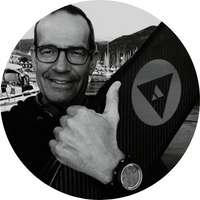
 Xavier Daru
Freediver
Xavier Daru
Freediver

 Xavier Daru
Freediver
Xavier Daru
Freediver
During the 50's we hardly knew the meaning of the word "apnea". 70 years later, the sport has taken a remarkable step forward, international competitions have multiplied and the French occupy a prominent place. What happened during this period? It is perhaps no coincidence that the French are so good. What are France's strengths? The combination of historical, geographical, and technical events triggered the rapid growth of French freediving according to Xavier Daru.
The country is directly oriented towards several seas: North Sea, Channel, Iroise Sea, Atlantic Ocean, Mediterranean Sea. The waters are temperate (and mostly clear) during the summer season. The Gulf Stream softens the temperatures in the Atlantic. France's continental seafront stretches for around 3,500 kilometers, with nearly 200 ports; shipbuilding, military ports, commercial ports, marinas, fishing ports.
France Overseas territories are almost everywhere around the globe : Guadeloupe, Martinique, Guyane, La Réunion, Saint-Martin, Saint-Barthélemy, Saint-Pierre-et-Miquelon, Mayotte, Nouvelle-Calédonie, french Polynesia, Wallis-et-Futuna, Terres Australes Et Antarctiques Françaises, Île de Clipperton. France has the second biggest worldwide maritime territory. The very maritime geography of France makes it easy -for the french- to go to sea. There are a lot of people trying scuba diving, or spearfishing, or freediving. This wide “amateur base” is a useful foundation that creates demand in all clubs across the country. And these clubs will not lack swimming pools since there are 4,500 of them in France.
There had already been diving experiences during the 18th and 19th centuries. But the solutions were complex as they required a physical connection between the boat and the diver for air. In the 1950s, Cousteau used and implemented discoveries that allowed the development of scuba diving, such as the underwater mask, transportable air bottle with regulator, fins, neoprene suit (Beuchat).
Cousteau is one of the most famous French people in the world. He is also a very good communicator and he succeeds, with passion, in testing and improving equipment that drives developments in underwater fields at high speed. Using freshly developed underwater cameras, his report "The Silent World" (1956) co-produced with Louis Malle won the Palme d'Or at the Cannes Film Festival. Cousteau (and his Calypso team) created more than 100 scuba films in a 30 year period! Some of his best ones are:
1943: Shipwrecks
1959: The Golden Fish
1964: World Without Sun
1975: Voyage To The Edge Of The World
1976: The Fish That Swallowed Jonah
CMAS was created in 1959, and its first president was, you guessed it, Cousteau! CMAS actively participated in structuring recreational scuba diving, identifying good practices for this sport, and promoting training for practitioners and clubs. Cousteau created a craze for underwater beauty and a desire to dive among the French!
This film was produced by Luc Besson. After a slow start at the box office, the film became a strong success and has been seen by 9 million French viewers plus another 2 million worldwide. The film was like a spark, it created a huge interest in freediving in France, and a lot of record attempts. But there were no standard set of rules nor solid safety guidelines.
In 1992 Claude Chapuis created AIDA - Association Internationale pour de Développement de l’Apnée. The objectives of AIDA were:
- Create a stable and safe set of rules and guidelines for competition and record attempts.
- Participate in scientific studies on breath hold diving to further the understanding of the human body’s reaction to deep diving and thus improving safety guidelines and regulations.
- Demonstrate to the world that freediving is safe, fun, challenging, and a fantastic blend of inner peace, concentration, technique, training and team work.
Years after years, AIDA rules, trainings, programs and best practices, generated the creation of a lot of freediving clubs in France, but also of strong knowledge and deep diving experiences.
Claude Chapuis did a lot for the French freediving schools. His tremendous work allowed the creation of two key freediving clubs: CIPA and NUC, where everything began. Claude has also facilitated the emergence of many champions. He and his team also developed a huge database of knowledge and experiments around the sport.